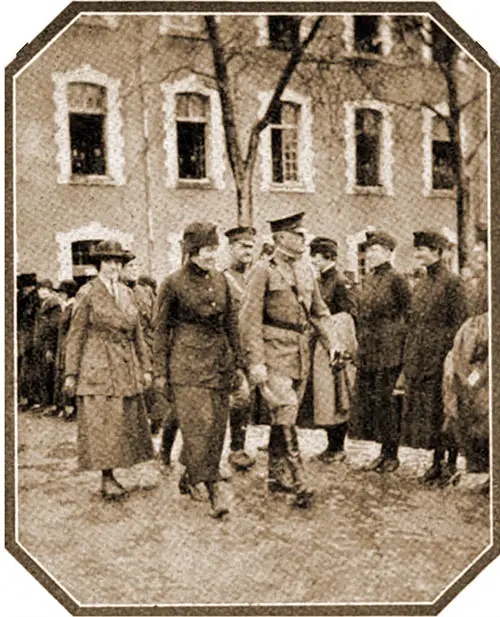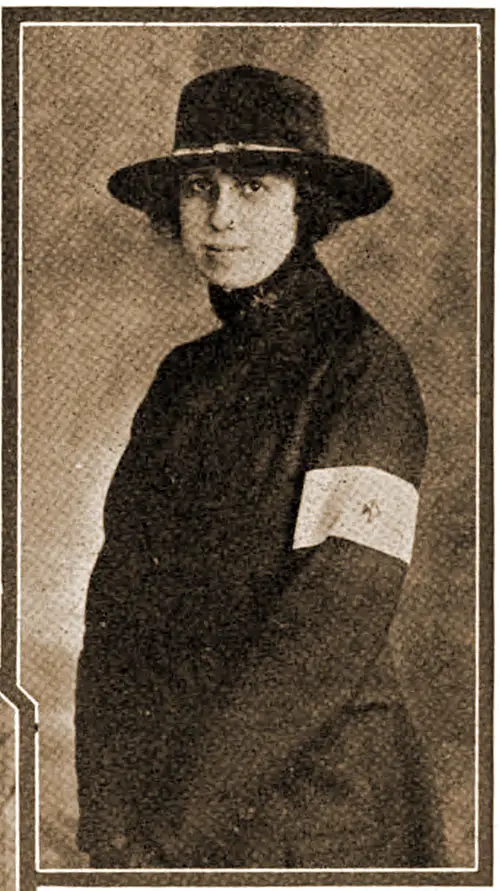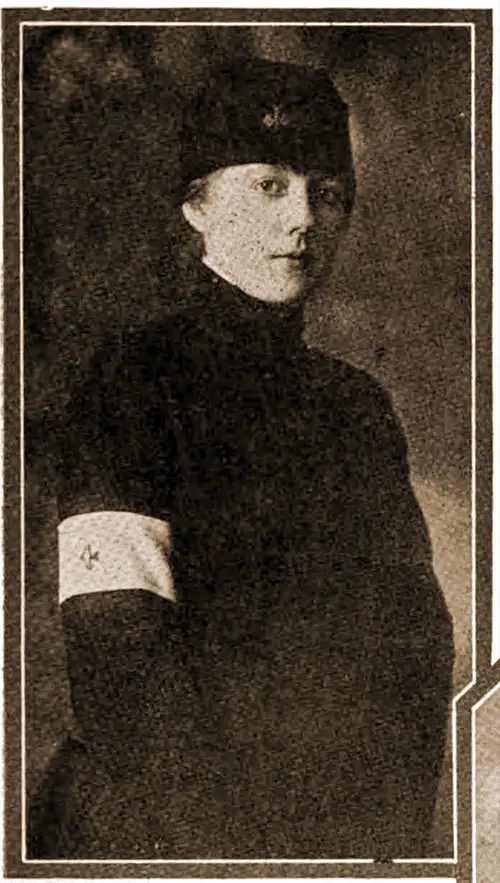Life of Our Telephone Operators in France - 1919

The “General Pershing Inspection" — at Which the Camera Caught the General Just as He Passed the Smiling Miss Erickson. Miss Grace D. Banker, Chief Telephone Operator, Escorted the General during the Inspection. Bell Telephone News, November 1919. GGA Image ID # 19b1317822
Neither Miss Lydia Erickson nor Miss Mabel Lapp are the sort of people one would expect to break into song, but the smiles that play on their lips and the light that comes to their eyes when they tell of their experiences overseas make one think of a famous line from a famous light opera, which runs:
“All for glory the soldier's life …”
“All for glory the operator’s life in France,” Miss Lapp said recently to a Bell Telephone News reporter.

Miss Mabel Lapp, Signal Corps Telephone Operator. Bell Telephone News, November 1919. GGA Image ID # 19b131e3ef
“It was wonderful; quite the most delightful and the most worthwhile experience I have ever had. I think my year in England and France equivalent to a four-year college education. Certainly it was a knowledge broadener."
“I left New York on September 14, 1918,” she continued, “in perfect health, but just a week later I was carried from the ship on a stretcher at Southampton. It was the dreadful influenza, and it took me to the American Base Hospital at Portsmouth.
My recovery was rapid, however, for I was sent to London to convalesce. After seeing London I journeyed to Southampton again, and while awaiting passage over the Channel I took the opportunity to visit the Eastleigh Naval Aviation Camp.
My first attempt at a channel crossing was a failure, for submarine ‘trouble’ cause us to turn back when we had half of the voyage to La Havre accomplished. We made La Havre the next day, however, and I went on to Paris, and then to Tours to report.
After four days of Tours I was sent back to Paris, where first I was stationed at the Elysées Palace. I worked shortly afterwards at Aviation Headquarters, and I finally wound up at the long-distance office at La Belle Epine, eight miles outside of Paris.
However, I lived in Paris and ‘commuted’ each day, making the journey part of the way in army trucks and the rest of the way in Red Cross ambulances.
“Our equipment was the familiar Western Electric equipment, and on it was my privilege to handle the long-distance calls to Germany.
“I loved Paris, and I plan to visit it again within a few years. Armistice night, of course, was exciting. I am an amateur photographer, and I took many pictures, and I highly value my collection of war scenes. I was in four or five automobile accidents going to and from work, and I was a bit cut up by flying glass, and there was a period last February when all of the operators at the long-distance office had to wear ‘flu’ masks. The operators were always well looked after, and the American soldiers showed us every consideration, and the French people were most cordial.
“And England was a big garden, but I didn't care for London.
“There” … and Miss Lapp heaved a little sigh of relief … “I have given you a complete history I If there is anything more you wish to know I shall be glad to answer any questions.”
“I have just two,” said the reporter. “The first one is, how long have you been with the Chicago Telephone Company?”
“Six years,” Miss Lapp replied, “all of them spent in Evanston. And question number two?”
“Do you like ‘Mother Bell'?”
“I should say so!” she exclaimed heartily, and the interview was at an end.
* * *
Twelve or thirteen years has Miss Erickson been with the Chicago Telephone Company in Chicago, and she was as enthusiastic as Miss Lapp over her experience in France, England, Scotland, and Wales she toured, weekends she spent in Paris, and she enjoyed Tours, where she was stationed for eleven months.

Miss Lydia Erickson, Signal Corps Telephone Operator. Bell Telephone News, November 1919. GGA Image ID # 19b19ee254
As a magazine subject Miss Erickson has one very decided fault—she is most modest—but the reporter finally extracted from her the fact that she had gone overseas as an operator and had returned with a supervisor’s rating.
"We couldn't have been better provided for," she said simply, " and I cannot say too much for the Signal Corps officers. They were courteous and considerate always.
"I instructed the boy in 'Class C’ - a class made up of soldiers wounded at the front and unfit for active service again --who desired training as operators. This instruction was given on a field switchboard, and the boys were willing and capable students.
"I had to 'wait in the rain for three hours to be inspected by General Pershing,' but that was the lot of almost every operator and every soldier overseas, so I can't complain. And Fate was good to me, for she took my picture with the General!
“My only annoying experience happened on the way home. A soldier at Brest was carrying my baggage for me, and on the way to the boat we became separated and that was the last I ever saw of my belongings!
"So I went aboard without even a toothbrush, and though I did secure a toothbrush on the vessel I didn't manage to secure much else, and I made the voyage home with nothing save the clothes I was wearing. Luggage, I understand, is the principal worry of most trans-Atlantic tourists, but lack of luggage was my sole bother.”
Both Miss Erickson and Miss Lapp are “back on the old job," and while they still dream pleasant dreams of their days in France, they admit that deep down in their hearts it seems mighty good to be " home.”
“Of Interest to Our Girls,” in Bell Telephone News, Detroit Edition, Vol. 9, No. 4, November 1919, p. 11-12.
